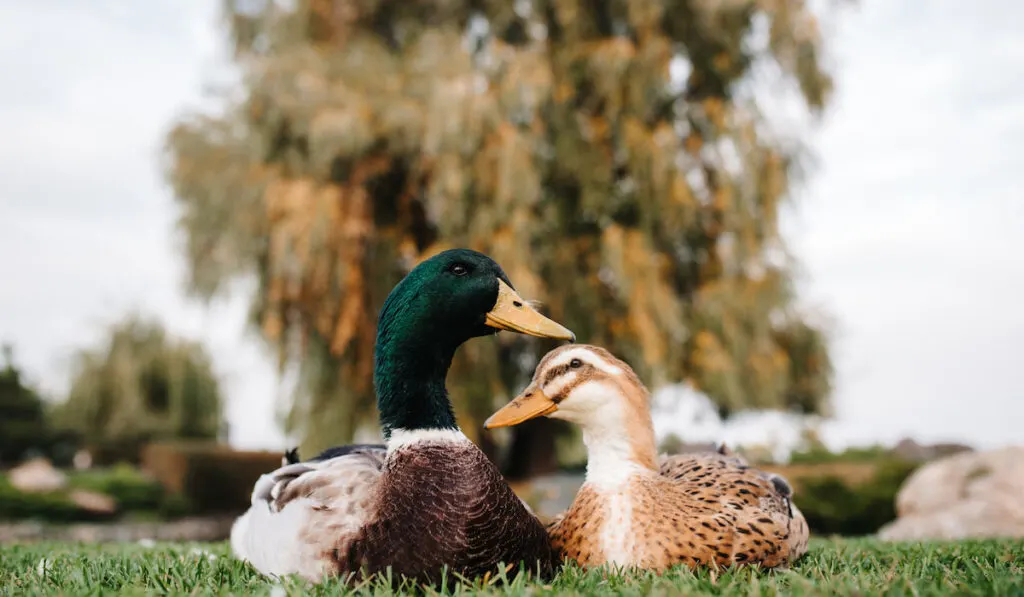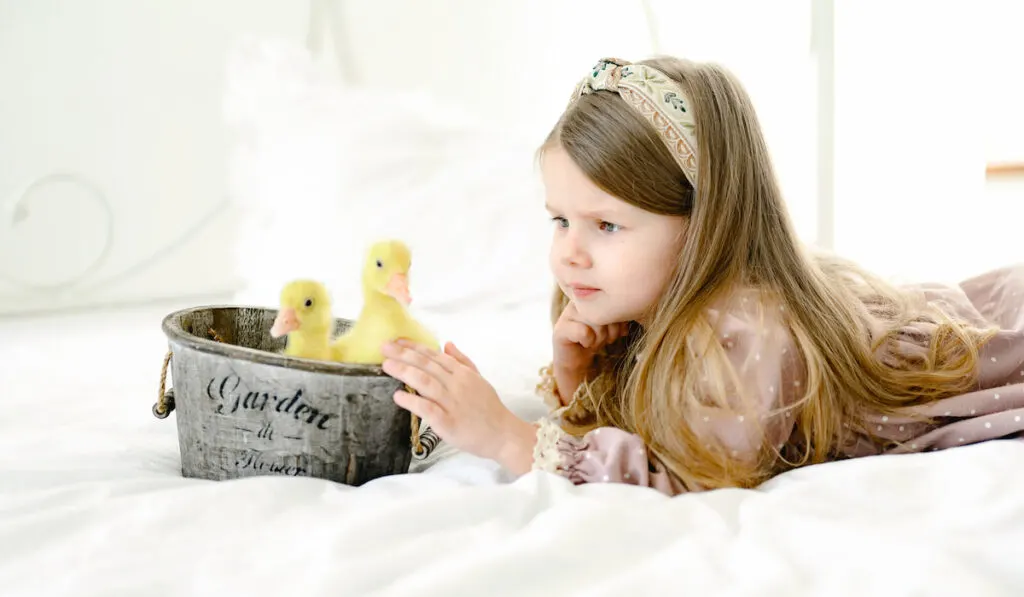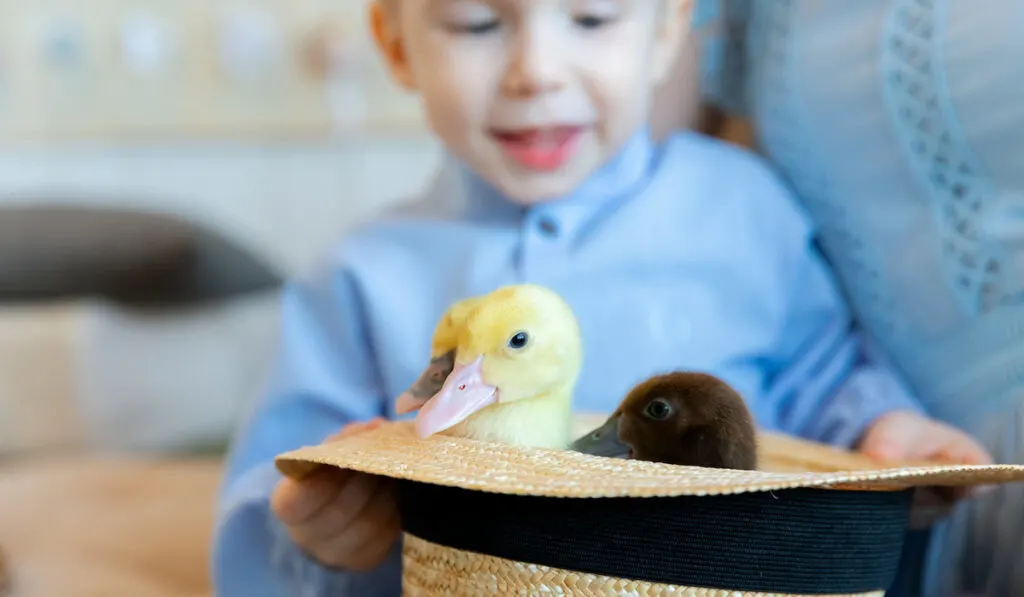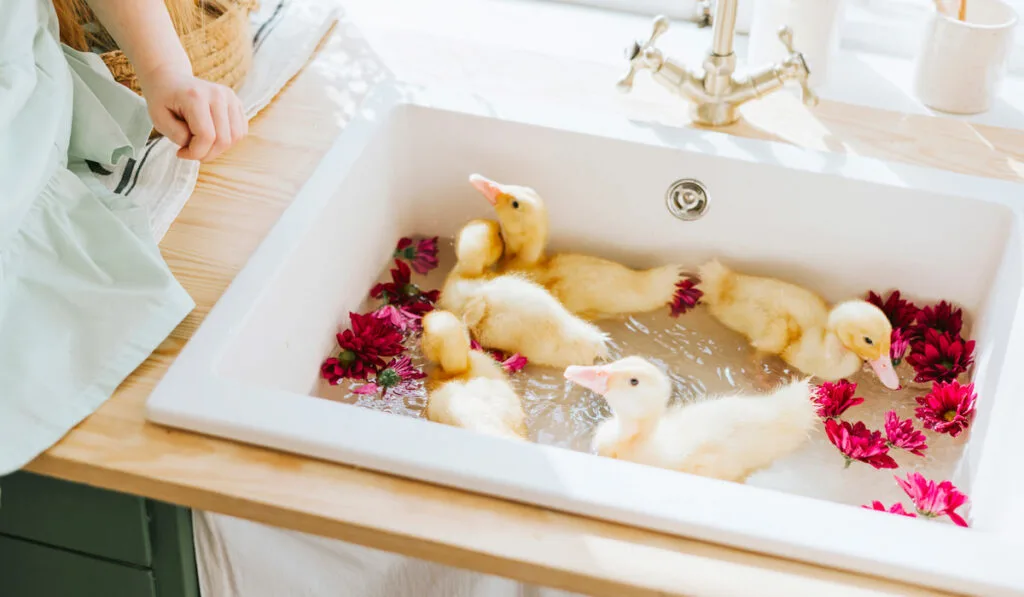Are you considering taking on a duck as a pet? This might be a bit of a unique option for pet owners, and it’s understandable if you are unsure whether or not to move forward.
You might be wondering if ducks make good pets or if they are the right fit for you. If not, you might decide to go with another animal.
We’ve collected a number of pros and cons for you to keep in mind when considering ducks as pets. These insights might just help guide your decision.

Table of Contents
11 Pros for Keeping Ducks as Pets
1. Ducks Are Cute
Ducks are cute, no doubt. But ducklings are even more adorable.
Both have fluffy feathers that are nice to cuddle. They have tiny eyes alongside their bills that make it seem like they are always smiling or about to smile.
Their flappy feet and waddles are funny and adorable. When you hold them in your hand, the way they snuggle in it is also quite cheery. If you are going for total cuteness in your pet, you may opt for a duckling instead of a duck to start out with.
2. Ducks Are Hardy
Ducks are quite hardy. They can adapt when the weather is very chilly, and they are not hard to manage when the environment is hot.
Compared to chickens, ducks are not as prone to falling ill. Also, there are only just a handful of duck diseases to worry about.
3. Ducks Don’t Always Fly
You might be worried that your winged pet may try to fly away or that it may get into your neighbor’s backyard.
The good news is that there are a number of domestic duck breeds that do not fly, and those that do will not go very high or far.
If you are mindful about the breed you select, you will not have to worry that your duck will get loose or spend money on ways to keep them in your yard.

4. Ducks Are Unlikely to Carry Pests
Since ducks spend a considerable amount of time in water, they are less likely to get pests like mites and lice in their feathers. When you are not playing with or grooming your duck, it will probably be swimming and it’s feathers are typically self cleansing.
5. Ducks Like Companions.
Another great thing about getting ducks as a pet is that you can get more of them with ease.
This is especially true if you have a female duck. Female ducks are open to new ducks joining their home. They are usually relaxed about having other ducks around. You will not have to deal with the hostility that comes with introducing a new animal to your home.
You can also consider adding males, but just a few. The males are territorial, and if you have more than 2-3 around, there will be hostility.
6. Ducks Are Relaxing to Watch
Ducks are a sight to behold. You can have a relaxing time just watching them swim or flap around in dirt baths. When you fill their pool with clean water, you can almost feel the joy in their reaction.
Watching them interact with one another is amusing. The way they speak to each other is entertaining, and their expressiveness via body language is fun to watch.
7. Ducks Are Inexpensive to Feed
Compared to dog food and cat food, a duck’s food is significantly cheaper. You can get a 50 pound bag for around $25-35. You can even supplement the food with some oats or straw to make it last longer.

8. Ducks Are Friendly
Ducks can be very friendly if you pay attention to them. Hold them frequently, feed them by your hands, and play with them, and they will become very familiar with you.
However, if you do not have enough free time to socialize with them, they should still be rather friendly.
9. Ducks Lay Eggs
If you keep ducks as pets, you may just get more than just cuteness and entertainment. Ducks lay eggs, and you can eat these eggs.
On average, ducks lay 200-250 eggs per year, and they maintain this rate of productivity late into their lifetime. Ducks as old as 9 years will still produce around the same rate.
They also lay eggs during winter. So, you can keep getting eggs for many, many years. Since the eggs are laid right in your house, you get them fresh.
10. Ducks Provide Free Fertilizer
If your duck lives indoors, you cannot train it to use the toilet. You will need to take it outside especially when it has to do its business.
The benefit that comes from your duck pooping outside in your garden or lawn is that it can make the soil more fertile. Ducks provide free fertilizer for their owners.
11. Ducks Offer Natural Pest Control
Ducks are omnivores. Besides the plant matter available to them, they can also eat bugs and other forms of pests.
Ducks eat a wide range of household pests. If you have snails and slugs disturbing your garden, your duck can help you get rid of them by eating them.
Your ducks will also eat insects such as mosquitoes, grasshoppers, ticks, worms, and roaches. Sometimes, they may even go after larger pests like snakes, mice, and frogs.

5 Cons for Keeping Ducks as Pets
Like most pets, there are downsides to keeping ducks. Here are some cons to keep in mind before taking on a pet duck.
1. Ducks Can Be Quite Noisy
Ducks are actually very noisy. When they are swimming, they splash loudly.
Ducks are very expressive, and they communicate a lot. When they are ranging freely, they chatter.
One duck talks, then the others join in and quack back several times. While you may be unbothered by the noisiness of your ducks, your neighbors might be displeased.
2. Ducks Grow Very Fast
If you get your duck because of how cute they are, you might get discouraged when they grow. Adult ducks are cute, but ducklings are even more adorable.
Ducklings can grow to become as much as 7 times their size within weeks. The initial cuteness can change in just a few in weeks.
3. Ducks Are High Maintenance
Ducks need a pool or a place to swim and splash around. You can build one for them, or you may buy a kiddie pool. But that’s not where the work stops.
Ducks will always get the water in the pool dirty, so you have to empty the pool and refill it with clean water routinely. Ducks also splash while swimming, and they could get the area around their pond messy. This means one more place for you to clean.

4. Ducks Poop a Lot
Ducks poop a whole lot. While their poop is great for your lawn, it can be very smelly. This means you have extra maintenance duty for you.
You may have to hose the places they poop in every day to get the smell out. You might want to restrict where the ducks wander freely so that you can contain where they are doing their business.
5. Ducks Might Eat Your Garden
Just as some pests are not safe around your ducks, your plants may not be safe either. Since ducks are omnivores, they also eat plants.
If the plants in your garden look appealing, your ducks will eat or nibble them. This is especially true if the plants are within their height range.
Ducks enjoy plants like kale, chard, chicory, or lettuce. If you have these greens in your garden, you might want to shield them from your duck.
